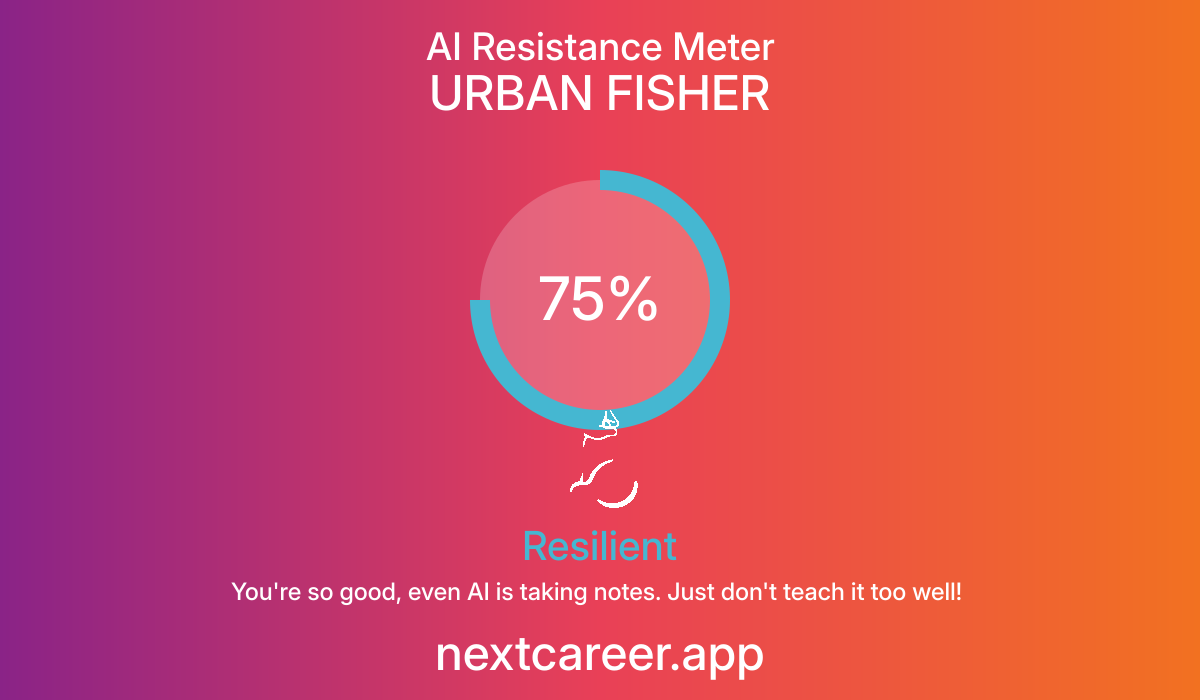AI Resistance Analysis
URBAN FISHER
URBAN FISHER
AI Resistance Score
AI Resistance Meter
Resilient
URBAN FISHER
You're so good, even AI is taking notes. Just don't teach it too well!
The role of an urban fisherman encompasses a variety of tasks, including understanding fish ecosystems, navigating urban waterways, and engaging with local communities. Tasks require a hybrid of ecological knowledge, practical skills, and social engagement, which current AI technologies struggle to replicate fully. While AI could assist in monitoring fish populations or optimizing fishing techniques, the nuanced decision-making and deep local knowledge required present significant barriers to full automation.
The role of an urban fisherman encompasses a variety of tasks, including understanding fish ecosystems, navigating urban waterways, and engaging with local communities. Tasks require a hybrid of ecological knowledge, practical skills, and social engagement, which current AI technologies struggle to replicate fully. While AI could assist in monitoring fish populations or optimizing fishing techniques, the nuanced decision-making and deep local knowledge required present significant barriers to full automation.
Key Factors
- Cognitive Tasks: Urban fishing requires localized ecological knowledge and the ability to adapt strategies based on environmental conditions. This cognitive flexibility is a strength against AI.
- Emotional Intelligence: Building relationships within the community and engaging in local stewardship activities require human empathy and understanding, which are difficult for AI to replicate.
- Physical Skills: The physical aspect of fishing may see some automation through robotics, but the intricacies of handling fishing gear and navigating diverse urban waterways are still largely human-operated.
- Creative Thinking: Creative problem-solving in adapting fishing techniques or developing community-based fishing initiatives adds to job resistance against AI replacement.
Human Advantages
- Local ecological knowledge is irreplaceable and specific to community conditions; AI lacks contextualized understanding.
- Human rapport and trust-building are crucial in community initiatives related to urban fishing.
AI Vulnerabilities
- Emerging AI tools can provide data on fish populations and environmental monitoring, potentially reducing the need for traditional navigation skills.
Recommended Actions
- Invest in training for developing a deep understanding of local ecosystems and community engagement strategies.
- Explore partnerships with AI developers to integrate technology that complements human expertise rather than replaces it.
- Advocate for policies that support sustainable urban fishing practices and community involvement.
- Promote educational initiatives that bridge ecological knowledge with technology, ensuring urban fishers remain relevant in an evolving industry.
In the near term (5 years), urban fishing may increasingly incorporate AI tools to enhance decision-making and efficiency, but the core aspects of the role will remain human-centered. In the long term (20+ years), as AI evolves, there may be more competition from automated systems for monitoring fish populations, but the human element in community engagement will likely prevent full automation of the role.

Why Calculate AI Resistance?
Understanding how AI-resistant your career is becoming increasingly important in today's rapidly evolving job market. Our analysis combines multiple factors including required human skills, technological adaptability, and future industry projections to give you a comprehensive view of your career's sustainability.